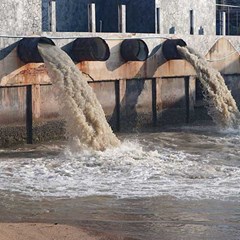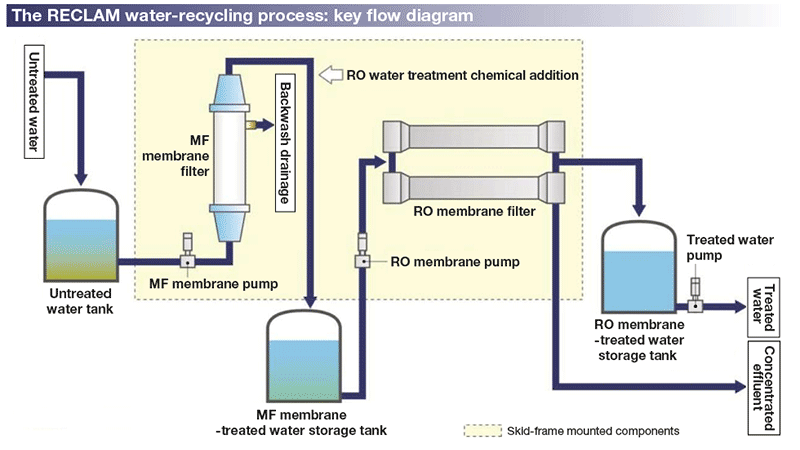Industrial Waste Water Treatment-- Industrial-Grade Water Filtration and Purification Solutions
Industrial Waste Water Treatment-- Industrial-Grade Water Filtration and Purification Solutions
Blog Article
Obstacles and Solutions in Hazardous Waste Water Treatment
The treatment of industrial wastewater provides a diverse variety of difficulties, varying from stringent regulative compliance to the complexities of cost management and technological limitations. The irregularity in waste make-up further complicates the efficiency of standard therapy methods, often resulting in intensified operational expenses. Emerging remedies such as sophisticated oxidation processes and ingenious funding models reveal assurance in resolving these concerns. As industries come to grips with the requirement for sustainable methods, the inquiry continues to be: what strategies will eventually result in an equilibrium between compliance, cost-efficiency, and ecological responsibility?
Regulatory Conformity Difficulties
Just how can commercial centers browse the facility landscape of regulative compliance in wastewater therapy? The regulative framework governing wastewater administration is multifaceted, usually varying by jurisdiction and kind of industry. Facilities has to comply with federal, state, and local laws that determine effluent high quality requirements, discharge limitations, and tracking requirements. Failing to comply can cause severe charges, consisting of penalties and functional closures.
To effectively take care of these conformity obstacles, centers must carry out robust tracking and reporting systems that ensure real-time data collection and evaluation. Routine audits and risk assessments can identify prospective conformity gaps, permitting for positive modifications in treatment processes. Staff member training programs concentrating on governing expertise and finest methods are vital to cultivate a culture of compliance within the organization.
In addition, involving with governing agencies can supply useful understandings and make clear uncertain regulations. Facilities may additionally profit from talking to ecological specialists that specialize in wastewater therapy conformity, ensuring that they remain abreast of progressing policies. By taking on these methods, commercial facilities can not only fulfill compliance demands but additionally boost their operational performance and environmental stewardship.
Price and Financial Barriers
Browsing regulatory conformity in wastewater therapy usually offers significant financial challenges for commercial facilities. The costs connected with executing necessary treatment modern technologies, keeping conformity with rigid guidelines, and managing operational expenditures can be intimidating. Numerous organizations deal with high preliminary capital investment for the building or updating of wastewater therapy plants, which might stress budget plans, specifically for small and medium-sized ventures.
Additionally, continuous operational prices, including labor, upkeep, and chemical inputs, contribute to the financial concern. The unpredictability of rising and fall energy rates and the possible need for additional financial investments to fulfill progressing policies worsen these financial stress. In a lot of cases, the absence of financial incentives or assistance from government bodies makes it also extra tough for companies to warrant financial investments in innovative treatment systems.
Additionally, the financial stability of wastewater treatment options is usually questioned, specifically for markets with limited revenue margins. It is vital for industrial facilities to explore affordable strategies, such as embracing ingenious funding options, involving in partnerships, and leveraging arising modern technologies that can help minimize these economic barriers while ensuring conformity with ecological standards.

Technological Limitations
Numerous technical restrictions hinder the efficiency of commercial wastewater treatment procedures. One considerable difficulty is the insufficiency of existing therapy modern technologies to address complicated impurities.
Furthermore, the scalability of treatment innovations postures an obstacle. While some advanced approaches, like membrane layer filtering or sophisticated oxidation, show pledge in regulated environments, their execution on a bigger scale can be prohibitively costly and technically tough. Upkeep and functional intricacies further complicate the adoption of these systems, view particularly for smaller sized markets with limited technological expertise.
The integration of real-time monitoring innovations also stays inadequate in numerous treatment centers. Without effective tracking systems, operators can not effectively evaluate therapy performance or discover prospective failures, causing irregular effluent top quality. Subsequently, addressing these technical restrictions through r & d, along with investment in cutting-edge remedies, is vital for improving the efficiency of commercial wastewater treatment and making certain regulative conformity. Industrial Waste Water Treatment.
Irregularity in Waste Composition
In the world of commercial wastewater treatment, the variability in waste make-up offers a powerful difficulty. Industries produce wastewater with diverse attributes, affected by aspects such as production procedures, resources, and operational techniques. This diversification complicates the treatment procedure, as standard systems commonly battle to efficiently address the vast array of contaminants existing.
For example, wastewater from food processing might contain high degrees of raw material, while effluents from chemical production could consist of harmful compounds and hefty steels. This variation necessitates versatile therapy methods to guarantee conformity with ecological guidelines and shield public health and wellness. Furthermore, variations in waste composition can happen with time, influenced by changes in manufacturing timetables, upkeep tasks, or the intro of new products.

Ingenious Therapy Solutions
Cutting-edge treatment remedies are necessary for addressing the intricacies of industrial wastewater management. Conventional methods typically fall brief in efficiently removing a vast array of impurities, particularly in centers with varied effluent streams. Recent improvements focus on incorporating cutting-edge technologies to improve therapy effectiveness and sustainability.
One appealing approach is making use of innovative oxidation processes (AOPs), which utilize powerful oxidants to deteriorate organic toxins. AOPs, including photocatalysis and ozonation, can dramatically lower harmful compounds and improve effluent high quality. In index addition, membrane bioreactor (MBR) innovation has actually gotten grip, integrating organic therapy with membrane layer filtering, leading to high-quality effluent and lowered impact.
An additional ingenious option is the implementation of source recuperation systems. Methods like anaerobic food digestion not only treat wastewater yet additionally generate biogas, which can be utilized as a renewable resource source. The adoption of artificial intelligence and maker understanding versions can enhance therapy procedures by anticipating variants in wastewater composition, therefore improving operational effectiveness.
These cutting-edge options not only address governing compliance yet additionally promote ecological sustainability, paving the means for an extra effective and durable industrial ecological community.
Final Thought
In conclusion, attending to the difficulties of industrial wastewater treatment requires a diverse method that integrates regulatory compliance, expense management, and technological developments. A commitment to continuous enhancement in therapy methods will eventually add to the effective administration of industrial wastewater and environmental protection.
The therapy of industrial wastewater offers a diverse variety of difficulties, ranging from strict governing compliance to the details of cost management and technical constraints. Industrial Waste Water Treatment.Browsing regulative compliance in wastewater treatment often provides significant economic difficulties for industrial centers. Dealing with these technical restrictions with research and advancement, alongside financial investment in cutting-edge solutions, is vital for boosting the efficiency of industrial wastewater treatment and guaranteeing regulatory conformity
Wastewater therapy centers should spend in durable monitoring systems and adaptable therapy innovations qualified of accommodating varying influent attributes.In final thought, dealing with the difficulties of industrial wastewater therapy calls for a multifaceted technique that integrates regulatory compliance, price monitoring, and technical innovations.
Report this page